When it comes to selecting the best Japanese Damascus knife, there is an overwhelming number of options available on the market. However, did you know that the demand for these knives has been steadily increasing over the past decade?
With their exquisite craftsmanship and exceptional cutting performance, it’s no wonder that more and more people are seeking out the finest Japanese Damascus knives. But how do you navigate through the multitude of choices to find the perfect one for your needs?
In this discussion, we will explore some of the top contenders in the Japanese Damascus knife realm, considering factors such as handle design preferences, blade thickness considerations, cutting edge sharpness, and price range options.
So, if you’re ready to elevate your culinary experience to new heights, let’s embark on this journey together to discover the best Japanese Damascus knife for you.
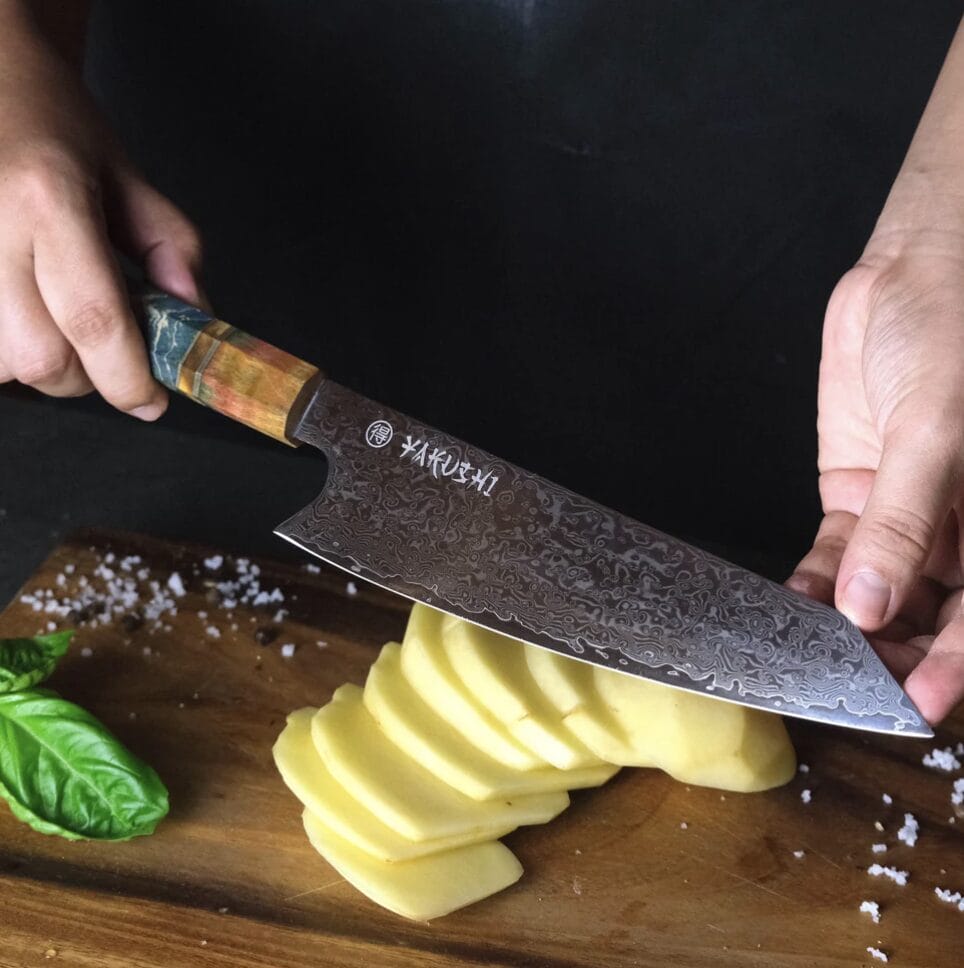
Key Takeaways
- Japanese Damascus knives are highly sought after for their exquisite craftsmanship and exceptional cutting performance.
- When choosing a Japanese Damascus knife, factors to consider include handle design preferences, blade thickness considerations, cutting edge sharpness, and price range options.
- Superior craftsmanship and durability are hallmarks of Japanese Damascus knives, thanks to materials like Damascus steel, VG-10, and AUS-10.
- Personal preferences, needs, and budget should guide the selection of the right Japanese Damascus knife.
Best Japanese Damascus knife
Let’s talk about the best Japanese Damascus knives on the market.
Some top contenders include: The Jikko Non Ebony Sujihiki, The Sakai Takayuki 17-Layer Gyuto Green & The Jikko Non Ebony Usuba.
Other notable options are: The Yakushi™ Damascus Kiritsuke Knife & The Yakushi™ Handmade Butcher Knife
These knives are known for their exceptional craftsmanship and performance, making them excellent choices for both professional chefs and home cooks.
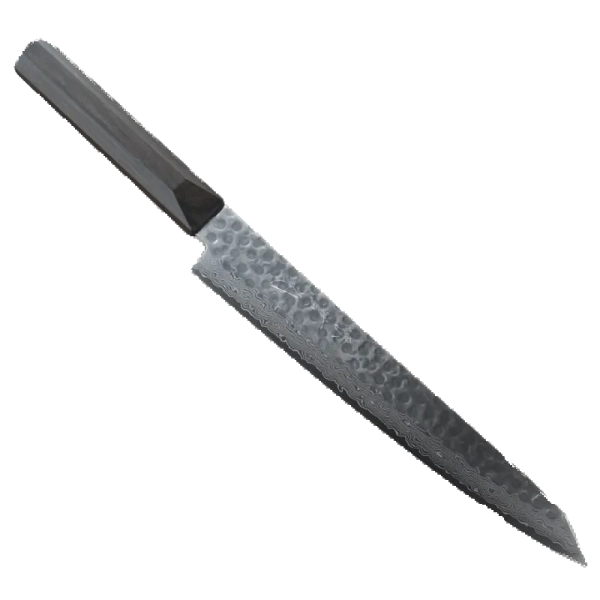
Jikko – Non Ebony Sujihiki
The Jikko – Non Ebony Sujihiki is the best Japanese Damascus knife for those seeking an ultra-sharp and versatile kitchen tool.
With its VG-10 Damascus blade, this slicer effortlessly slices through meats, fish, and vegetables, making it perfect for slicing, carving, and portioning ingredients.
The blade, made from layers of stainless steel with a hammered finish, not only adds to its aesthetic appeal but also enhances its cutting performance. The 23 cm blade length provides ample space for precise slicing.
To ensure its longevity, it’s important to avoid cutting hard or frozen materials and to hand wash with warm water and towel dry. Though there are no reviews yet, be the first to review the Jikko – Non Ebony Sujihiki and share your experience with others.
Best For: Those who want a high-quality Japanese slicer for precise slicing, carving, and portioning of meats, fish, and vegetables.
Pros:
- Ultra-sharp VG-10 Damascus blade for effortless cutting performance
- Beautiful hammered finish adds to the knife’s aesthetic appeal
- 23 cm blade length provides ample space for precise slicing
Cons:
- Not suitable for cutting hard or frozen materials
Sakai Takayuki – 17-Layer Gyuto Green
For those seeking the ultimate blend of craftsmanship and cutting performance, the ‘Japanese Damascus Knife’ offers a remarkable choice.
One option to consider is the Sakai Takayuki – 17-Layer Gyuto Green. While there are no reviews available yet, this knife holds great potential. With its 17-layer Damascus steel blade, it promises exceptional sharpness and durability.
The green handle adds a touch of elegance to its design. Priced at 309€, it falls within the higher price range, but the quality and craftsmanship justify the investment.
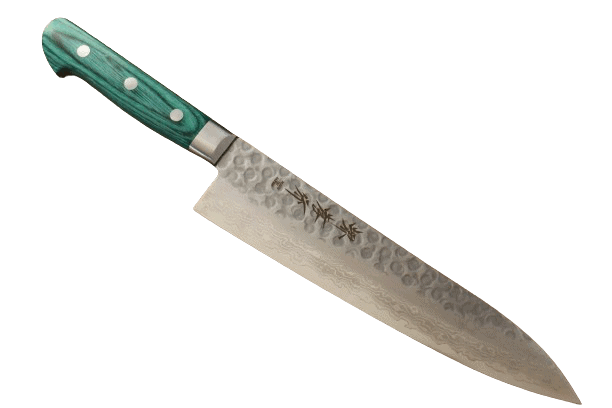
As a passionate knife enthusiast, I’m excited to try out this knife and see if it lives up to its reputation. If you’re looking for a Japanese Damascus knife that combines beauty and functionality, the Sakai Takayuki – 17-Layer Gyuto Green is definitely worth considering.
Best For: Knife enthusiasts and professional chefs looking for a high-quality Japanese Damascus knife that combines beauty and functionality.
Pros:
- Exceptional sharpness and durability with the 17-layer Damascus steel blade
- Elegant design with the green handle
- Craftsmanship and quality justify the higher price range
Cons:
- No reviews available yet, making it difficult to gauge customer satisfaction
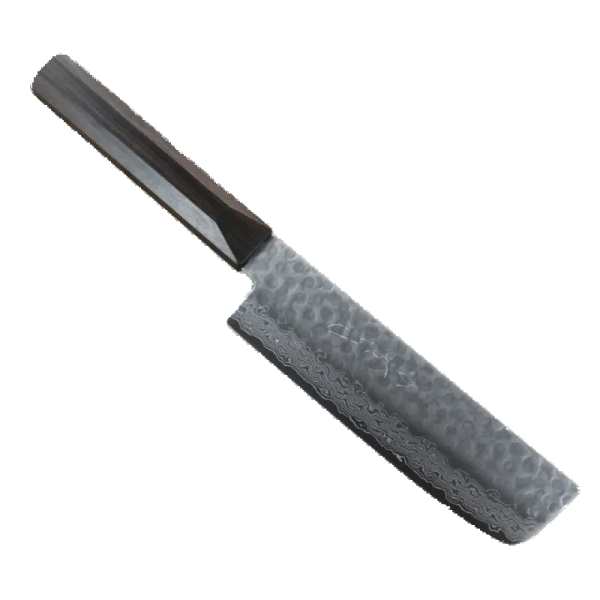
Jikko – Non Ebony Usuba
With its 17-layer construction and VG10 stainless steel core, the Jikko – Non Ebony Usuba is the ultimate choice for those seeking the best Japanese Damascus knife.
This knife offers a blade length of 160mm, making it perfect for various kitchen tasks, from small meals to large banquets.
The handle is made from ebony wood, providing a comfortable and secure grip that enhances your cutting experience.
Not only does the Jikko – Non Ebony Usuba excel in functionality, but it also boasts a sleek and elegant design that adds sophistication to any kitchen.
To ensure its longevity and safety, it’s important to hand wash the knife with warm water and towel dry it. Avoid cutting hard or frozen materials, as this can damage the blade and compromise its performance. Remember, dishwasher cleaning isn’t recommended.
Best For: Home cooks and professional chefs who value precision and durability in their kitchen knives.
Pros:
- 17-layer construction with VG10 stainless steel core ensures excellent strength and sharpness
- Ebony wood handle provides a comfortable and secure grip for enhanced control
- Sleek and elegant design adds sophistication to any kitchen
Cons:
- Requires proper care and maintenance, including hand washing and avoiding cutting hard or frozen materials
Yakushi™ Damascus Kiritsuke Knife
When it comes to a versatile, high-quality knife that combines performance and elegance, the Yakushi™ Damascus Kiritsuke Knife stands out as the best choice for professional chefs and home cooks alike.
This knife is designed and built to endure intense cooking sessions, providing comfort for hands and wrists.
Its perfect weight balance makes it easy to handle, while its sharp and durable 67-layer Japanese Damascus VG-10 steel blade offers versatility for various cooking tasks.
The knife’s comfortable wooden handle ensures an easy grip, making it suitable for tasks ranging from filleting to slicing and dicing.
Not only does the Yakushi™ Damascus Kiritsuke Knife excel in performance and functionality, but it also adds a touch of class and elegance to any kitchen. With its unique design and handcrafted attention to detail, this knife offers a premium and luxurious feel.
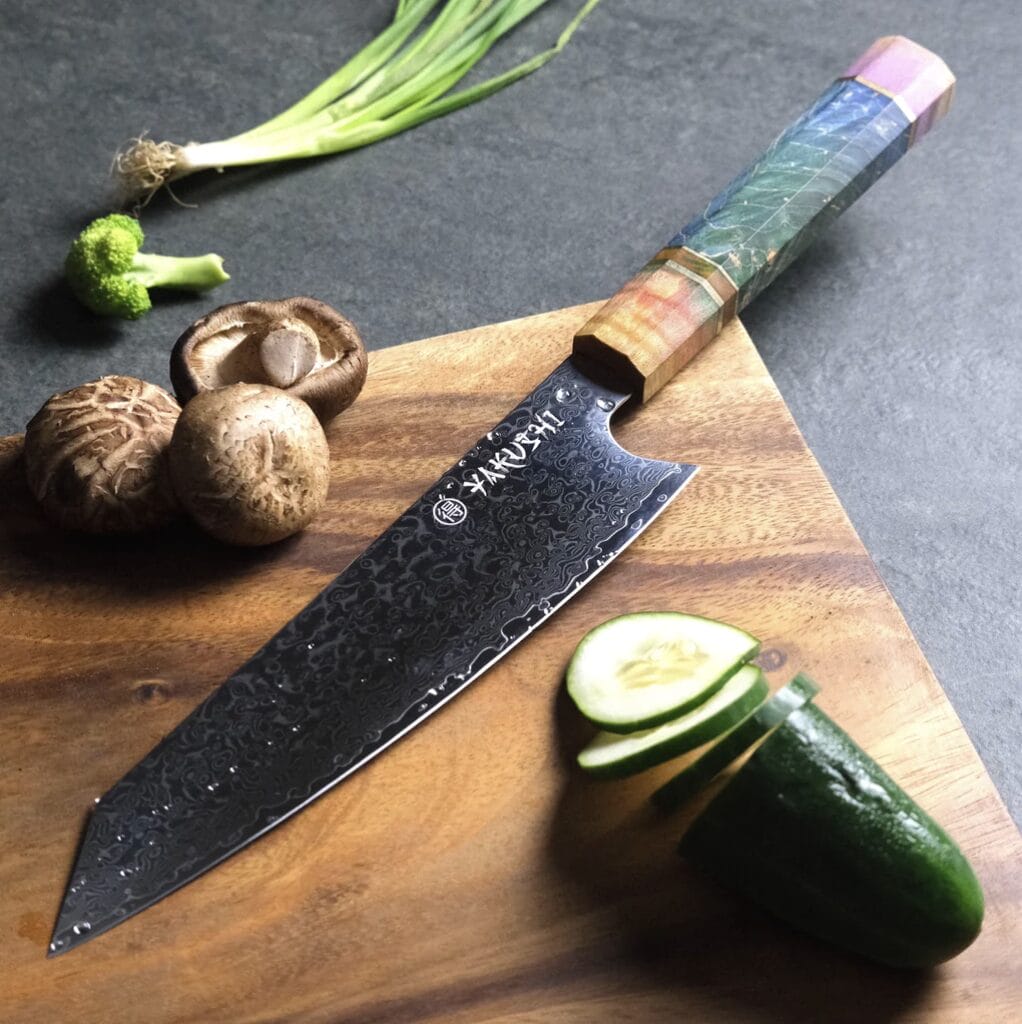
Its versatility allows it to replace a Nakiri vegetable knife and a slicing Yanigaba knife, making it an essential tool for both professional chefs and home cooks. Owning a Yakushi™ Damascus Kiritsuke Knife means owning a one-of-a-kind knife in the world, showcasing your individuality and style.
It can serve as a conversation starter in the kitchen and makes for a special and memorable gift. With its 8-inch multi-faceted blade and traditional Japanese design with a modern twist, the Yakushi™ Damascus Kiritsuke Knife is truly a kitchen masterpiece.
Best For: Professional chefs and home cooks looking for a versatile and high-quality knife that combines performance and elegance.
Pros:
- Designed and built to endure intense cooking sessions
- Offers comfort for hands and wrists
- Versatile for various cooking tasks
Cons:
- May be pricey compared to other knives on the market
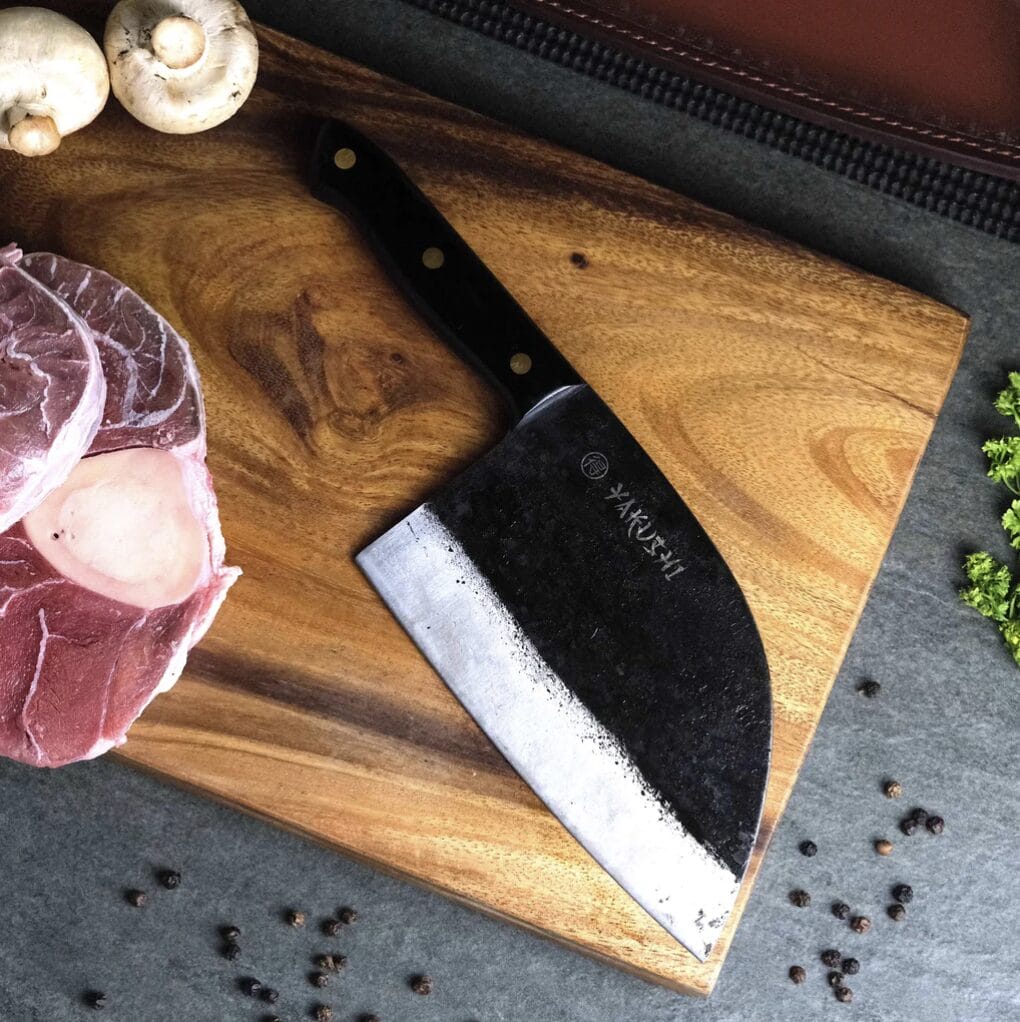
Yakushi™ Handmade Butcher Knife
The Yakushi™ Handmade Butcher Knife stands out as the best choice for professional chefs seeking a Japanese Damascus knife due to its superior craftsmanship and exceptional cutting performance.
This knife is designed with the needs of professional chefs in mind, offering durability and performance that can withstand the demands of a busy kitchen.
Made from high-quality materials, the Yakushi™ Handmade Butcher Knife boasts a sharp and long-lasting edge that ensures precise and effortless cutting every time.
The ergonomically designed handle provides a comfortable grip, allowing chefs to work with ease and precision. With its reliable craftsmanship, this knife is a trusted companion in the kitchen.
Whether you’re slicing through meats or chopping vegetables, the Yakushi™ Handmade Butcher Knife is the perfect tool for the job.
Things to consider when buying a Japanese Damascus knife
When buying a Japanese Damascus knife, there are several important factors to consider.
Firstly, the blade material options vary and can affect the knife’s performance and durability.
Secondly, handle design preferences should be taken into account for comfort and grip.
Additionally, blade thickness considerations, cutting edge sharpness, and price range options are also crucial factors to weigh when making a purchase.
Blade Material Options
Blade Material Options
Considering the blade material options is crucial when purchasing a Japanese Damascus knife. The steel material used in Japanese Damascus knives greatly affects their performance and durability. Among the best Japanese Damascus knives, Damascus steel is a popular choice. It’s known for its exceptional strength, sharpness, and corrosion resistance. The unique pattern on the blade, created by layering different types of steel, adds to its aesthetic appeal.
Other steel materials commonly used in Japanese Damascus knives include VG-10 and AUS-10. VG-10 is renowned for its high carbon content, which contributes to its superior edge retention. AUS-10, on the other hand, offers a good balance of hardness and toughness.
Ultimately, the choice of blade material depends on personal preference and specific usage requirements.
Handle Design Preferences
One important factor to consider when purchasing a Japanese Damascus knife is the preferred handle design. The handle not only provides a comfortable grip but also contributes to the overall aesthetic appeal of the knife. Here are four handle design preferences to keep in mind:
- Wood handle: Many knife enthusiasts prefer a wooden handle for its natural and warm feel. It adds a touch of elegance and beauty to the knife, enhancing the Japanese craftsmanship.
- Ergonomic shape: A well-designed handle should fit comfortably in your hand, allowing for a secure grip and reducing the risk of accidents. Look for handles with contours that conform to the shape of your palm.
- Balance: The handle should be balanced with the blade to ensure optimal control and maneuverability. A well-balanced knife allows for precise cutting, making your cooking experience more enjoyable.
- Durability: Consider a handle made from high-quality materials such as stabilized wood or resin, as they offer excellent durability and resistance to moisture and temperature changes.
Blade Thickness Considerations
Now let’s explore the important factor of blade thickness when purchasing a Japanese Damascus knife, building upon our understanding of handle design preferences.
When considering blade thickness, it’s crucial to find a balance between durability and performance. Japanese Damascus knives are known for their exceptional sharpness and precision, and the blade thickness plays a significant role in achieving this.
A thinner blade allows for effortless slicing and precise cutting, making it ideal for delicate tasks like preparing sushi or sashimi. On the other hand, a thicker blade provides more durability and can withstand heavy-duty tasks like chopping through bones.
It’s essential to consider the types of steel used in the Damascus blade, as different steels offer varying degrees of hardness and flexibility.
Ultimately, the right blade thickness will depend on your specific cutting needs and preferences.
Cutting Edge Sharpness
To ensure optimal cutting edge sharpness, it’s important to carefully consider certain factors when purchasing a Japanese Damascus knife. Here are four key points to keep in mind:
- Japanese Damascus Knives: Look for a knife that’s specifically designed and crafted in Japan. Japanese knives are renowned for their exceptional sharpness and precision.
- Damascus Chef Knife: Consider a Damascus chef knife for its superior cutting ability. The layered Damascus steel creates a sharp and durable edge, allowing for effortless slicing and dicing.
- Blue Steel: Opt for a knife made from blue steel, also known as Aogami. This high-carbon steel offers excellent edge retention and sharpness, ensuring that your knife stays razor-sharp for longer periods.
- Double Edge: Choose a knife with a double-edged blade. This design allows for versatile cutting techniques, whether you prefer a push or pull motion.
Price Range Options
When considering the purchase of a Japanese Damascus knife, it’s important to take into account the available price range options.
Japanese Damascus knives are revered for their exquisite craftsmanship and cutting performance, making them a valuable addition to any kitchen. The price of these knives can vary depending on several factors, such as the blade shape, the quality of the steel core, and the overall design.
For those who are passionate about Japanese cuisine or appreciate the artistry behind Japanese swords, investing in a high-end Damascus knife might be worth it. On the other hand, if you’re just starting to explore the world of Japanese knives or have a limited budget, there are also affordable options available that offer decent quality and performance.
It ultimately comes down to your personal preferences, needs, and budget when choosing the right Japanese Damascus knife for you.
Frequently Asked Questions
How Is a Japanese Damascus Knife Different From Other Types of Knives?
Oh, let us tell you how a Japanese Damascus knife is different from other knives! Its exquisite craftsmanship and beautiful patterned blade make it a true work of art, while its razor-sharp edge ensures precise cuts every time.
What Are the Benefits of Using a Japanese Damascus Knife?
Using a Japanese Damascus knife offers several benefits. Its high-quality steel provides exceptional sharpness and durability. The unique pattern on the blade adds elegance. It’s a versatile tool that enhances precision and control in the kitchen.
Are Japanese Damascus Knives Suitable for Both Professional Chefs and Home Cooks?
Yes, Japanese Damascus knives are perfect for both professional chefs and home cooks. They effortlessly slice through ingredients, enhancing the cooking experience. Trust us, once you try one, you’ll wonder how you ever managed without it.
How Do I Properly Care for and Maintain a Japanese Damascus Knife?
To properly care for and maintain a Japanese Damascus knife, we follow a few key steps. First, hand wash and dry it immediately after use. Then, store it in a knife block or sheath to protect the blade. Finally, regularly sharpen and hone the knife to maintain its sharpness.
Can I Use a Japanese Damascus Knife for Tasks Other Than Slicing and Chopping?
Yes, we can use a Japanese Damascus knife for tasks other than slicing and chopping. Its sharpness and durability make it versatile for various kitchen tasks like mincing, dicing, and even delicate tasks like peeling fruits and vegetables.
Conclusion
In conclusion, finding the best Japanese Damascus knife is like discovering a hidden gem in a treasure chest. With its exquisite craftsmanship and superior cutting performance, this knife is a must-have for any culinary enthusiast.
When purchasing one, remember to consider factors such as blade material, handle design, and overall balance. That is why my personal favorite Japanese Damascus knife is the Jikko – Non Ebony Sujihiki.
So, embark on your culinary journey with the perfect tool in hand and elevate your cooking to new heights. Happy slicing!
